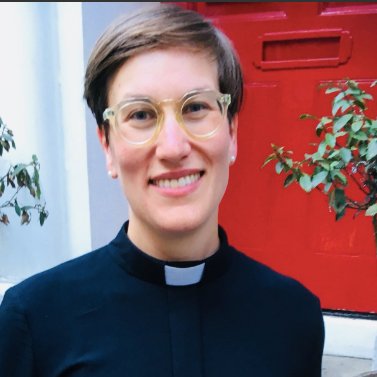1 July 2024
Introduction by Professor Graeme Smith
I’m delighted to introduce a series of blogs from our guest contributor The Revd Dr Ayla Lepine.
Ayla is a Visiting Scholar here at Sarum College who has contributed to a number of our courses. She writes as an art historian and theologian who serves as Associate Rector at St James’s Piccadilly in London. Ayla’s three blogs reflect on the intersection of arts and theology, drawing on her own experiences and her ministry.
Thinking about the interaction of culture and theology is central to our work in the College. Art, together with literature, poetry and music, expresses something of our concerns, values and beliefs as a society. It also gives us opportunity to employ our imaginations as we seek to explore our identity, our avenues for personal growth and flourishing, and the ways in which we can shape society for the better.
 by The Revd Dr Ayla Lepine
by The Revd Dr Ayla Lepine
Ecclesiart: Discovering Modern and Contemporary Sacred Art
The charity Art + Christianity was founded nearly 30 years ago in order to support, strengthen and establish new links between artists and places of worship, as well as offering opportunities for learning and communicating about theology and the arts in innovative ways. Community engagement and partnerships illuminates new ways of connecting with religion through the arts. One of the most important qualities of Art + Christianity’s work is its commitment to challenging and meaningful dialogues about the visual arts and their unique contribution to Christianity.
Recent and upcoming events and publications bring the arts into the heart of some of Christianity’s most urgent and profound territory. In June A+C held a study day at Bristol Cathedral focusing on art and atonement in relation to racial justice and contested heritage, led by Novelette Stewart, who is an Art + Christianity trustee and chair of the Church of England’s Contested Heritage Committee. In September there will be a pilgrimage to sacred spaces in Wales, exploring centuries of Christian art and architecture in relation to the theme ‘Vessel’. A book on connections between art and the Eucharist is currently in press, and Art + Christianity’s quarterly journal features many of this field’s foremost authors in theology and the visual arts. A+C is funded primarily by membership subscriptions, and membership is a great way to support the arts.
Art + Christianity’s website includes Ecclesiart, an online evolving catalogue of works of art in churches and cathedrals from 1920 to the present. An interactive map lists artworks by category, including medium (glass, textile, mosaic), genre (architecture, furniture, altarpieces). Ecclesiart is a free resource, which encourages learning, teaching, and discovery about works of art in places of worship throughout the UK, and encourages visitors to experience them first-hand.
One example is Naomi Blake’s Family Group , at the Quaker Friends House in London:
, at the Quaker Friends House in London:
When asked about the work, Blake explained, “There’s something positive in the human figure – there’s a lot of good in people… With my past, if I were pessimistic, it wouldn’t have been worthwhile surviving.”
As the Ecclesiart catalogue describes: “This is a remarkable thing for a survivor of Auschwitz to say, and this positive and hopeful spirit is subconsciously transmitted through Naomi Blake’s sculpture. Family Group is part of a large group of figurative sculptures created by Naomi Blake FRSS from 1970 to 2010. Here there is something of the love, warmth and security of family, perhaps representing the family she lost in the concentration camps – her parents, brothers, sisters and 10 nephews and nieces – and also representing the new family that she created after the war.”
—
The Revd Dr Ayla Lepine is leading a half-day online on 11 December – details via the link below:
Art for Advent: The Four Last Things
In the meantime, if you’d like to explore the intersection of art and theology further, there are a number of other forthcoming courses to consider:
Creation and Creativity – Painting with Sunlight (20 July)
Inspiration and Imagination: Creative Expressions of the Spiritual Life (9-12 Sept)
Environment, Art, Theology & Action (18 Sept)
Painting Icons Retreat (4-6 Oct)
Theology and Human Culture (14-17 Oct)
A History of Sacred Music by Women (17 Oct)
Creative Writing for Challenging Times (4-5 Dec)
The image illustrating this post is of Messenger by Peter Eugene Ball, from the College’s 2011 exhibition The Word. (Photo by Ash Mills)
Read the rest of the Art & Theology series
8 July Art and Religion at the National Gallery
15 July The Visual Commentary on Scripture
22 July Women Composers Who Made Music Against the Odds
29 July Art’s Invitation to Be Surprised

Leave a Reply
You must be logged in to post a comment.